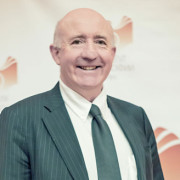I began my teaching career as a Teaching Assistant and Grader in the Philosophy Department at Yale University in the Spring Semester 1974 and I continued to work as a TA there until the Fall Semester 1978. As a Yale College Lecturer I taught a College Seminar in Ezra Stiles College at Yale in 1976 (on James Joyce).
At Yale I had inspirational teachers among whom I must mention Professors Karsten Harries, George Schrader, Louis Dupré and Rulon Wells, all of whom were totally dedicated both to philosophy and to the encouragement of young philosophers. I have tried to model my own teaching on their exemplary practices. In particular my supervisor Karsten Harries was a very close reader of term papers and dissertation draft chapters and was always challenging in discussion.
When I moved to Queen’s University Belfast as a Lecturer, I taught courses in medieval philosophy and in phenomenology from 1979 to 1982. Again, I must record my gratitude to the late Rev. Prof. James J. McEvoy who made medieval thought come alive and who taught me to appreciate the enduring significance of the Scholastic legacy and in particular his beloved Robert Grosseteste.
I then taught from 1982 to 1989 in Maynooth College as a College Lecturer and hugely enjoyed the experience. I taught Introduction to Philosophy courses as well as courses in Medieval Philosophy and Contemporary European Philosophy.
From 1989 to retirement, I taught at University College Dublin, my alma mater. Here I regularly teach both large undergraduate lectures (up to 500 students), upper level courses (c. 50 students) as well as intensive doctoral seminars (up to 15 graduate students). I love all kinds of teaching. Large lectures are a kind of drama, an exercise in theatre. The aim is to awaken minds. Seminars allow one to engage in close reading of a text. I have always liked the French tradition of explication de texte and this works very well reading the classics such as Heidegger’s Being and Time.
Over the years I have taught as visiting professor at Yale University, Northwestern University, Rice University, Connecticut College, Katholieke Universiteit Leuven, Murdoch University, the Chinese University of Hong Kong, Boston College, Sun-Yat-Sen University Guangzhou, PR China. Again I greatly appreciate the liveliness, intelligence and extraordinary optimism of American students. In contrast European students can seem somewhat reserved. Chinese students have asked me the most difficult questions.
In terms of innovation (that dreaded word beloved of university administrators), I was one of the first persons in the UCD Philosophy Dept to use Powerpoint overheads back in the early 1990s. Although I still use it for large classes, in general I find it a crude and inflexible tool that has not evolved well as a piece of software. It is, for instance, not easy to change or edit presentations as one is lecturing and students have long grown bored with silly graphics and cartoons. It is much better to engage directly with the students by presenting the problem in an interesting and dynamic manner — using liberal amounts of hand-waving, voice inflection, pacing up and down, and writing on blackboards or white boards.
